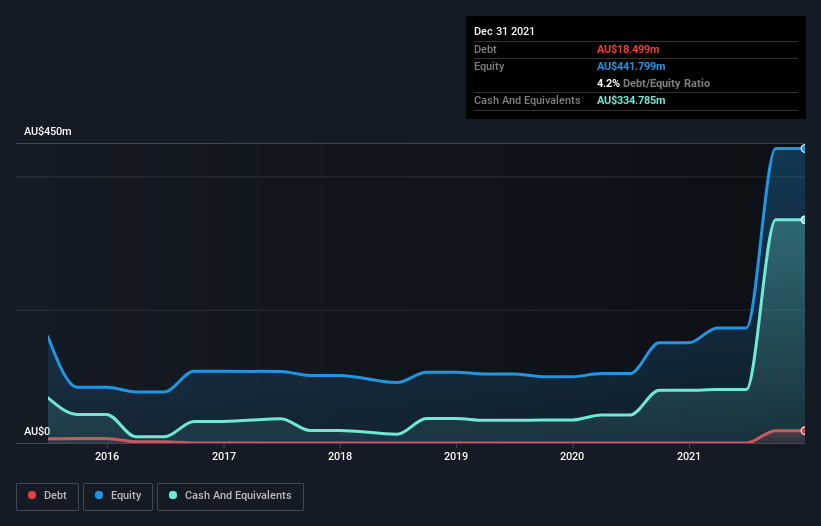Some say volatility, rather than debt, is the best way to think about risk as an investor, but Warren Buffett famously said that 'Volatility is far from synonymous with risk.' So it might be obvious that you need to consider debt, when you think about how risky any given stock is, because too much debt can sink a company. We can see that BCI Minerals Limited (ASX:BCI) does use debt in its business. But the more important question is: how much risk is that debt creating?
What Risk Does Debt Bring?
Debt and other liabilities become risky for a business when it cannot easily fulfill those obligations, either with free cash flow or by raising capital at an attractive price. Part and parcel of capitalism is the process of 'creative destruction' where failed businesses are mercilessly liquidated by their bankers. While that is not too common, we often do see indebted companies permanently diluting shareholders because lenders force them to raise capital at a distressed price. By replacing dilution, though, debt can be an extremely good tool for businesses that need capital to invest in growth at high rates of return. When we examine debt levels, we first consider both cash and debt levels, together.
Check out our latest analysis for BCI Minerals
How Much Debt Does BCI Minerals Carry?
You can click the graphic below for the historical numbers, but it shows that as of December 2021 BCI Minerals had AU$18.5m of debt, an increase on none, over one year. However, it does have AU$334.8m in cash offsetting this, leading to net cash of AU$316.3m.

A Look At BCI Minerals' Liabilities
We can see from the most recent balance sheet that BCI Minerals had liabilities of AU$30.6m falling due within a year, and liabilities of AU$35.0m due beyond that. Offsetting this, it had AU$334.8m in cash and AU$2.07m in receivables that were due within 12 months. So it actually has AU$271.2m more liquid assets than total liabilities.
This surplus strongly suggests that BCI Minerals has a rock-solid balance sheet (and the debt is of no concern whatsoever). With this in mind one could posit that its balance sheet means the company is able to handle some adversity. Succinctly put, BCI Minerals boasts net cash, so it's fair to say it does not have a heavy debt load!
Although BCI Minerals made a loss at the EBIT level, last year, it was also good to see that it generated AU$16m in EBIT over the last twelve months. There's no doubt that we learn most about debt from the balance sheet. But ultimately the future profitability of the business will decide if BCI Minerals can strengthen its balance sheet over time. So if you're focused on the future you can check out this free report showing analyst profit forecasts.
But our final consideration is also important, because a company cannot pay debt with paper profits; it needs cold hard cash. BCI Minerals may have net cash on the balance sheet, but it is still interesting to look at how well the business converts its earnings before interest and tax (EBIT) to free cash flow, because that will influence both its need for, and its capacity to manage debt. In the last year, BCI Minerals created free cash flow amounting to 6.4% of its EBIT, an uninspiring performance. For us, cash conversion that low sparks a little paranoia about is ability to extinguish debt.
Summing up
While it is always sensible to investigate a company's debt, in this case BCI Minerals has AU$316.3m in net cash and a decent-looking balance sheet. So is BCI Minerals's debt a risk? It doesn't seem so to us. The balance sheet is clearly the area to focus on when you are analysing debt. However, not all investment risk resides within the balance sheet - far from it. For example BCI Minerals has 3 warning signs (and 2 which are concerning) we think you should know about.
If, after all that, you're more interested in a fast growing company with a rock-solid balance sheet, then check out our list of net cash growth stocks without delay.
Valuation is complex, but we're here to simplify it.
Discover if BCI Minerals might be undervalued or overvalued with our detailed analysis, featuring fair value estimates, potential risks, dividends, insider trades, and its financial condition.
Access Free AnalysisHave feedback on this article? Concerned about the content? Get in touch with us directly. Alternatively, email editorial-team (at) simplywallst.com.
This article by Simply Wall St is general in nature. We provide commentary based on historical data and analyst forecasts only using an unbiased methodology and our articles are not intended to be financial advice. It does not constitute a recommendation to buy or sell any stock, and does not take account of your objectives, or your financial situation. We aim to bring you long-term focused analysis driven by fundamental data. Note that our analysis may not factor in the latest price-sensitive company announcements or qualitative material. Simply Wall St has no position in any stocks mentioned.
About ASX:BCI
BCI Minerals
A mineral resources company, engages in the development of industrial minerals in Australia.
Slight risk and slightly overvalued.
Similar Companies
Market Insights
Community Narratives



